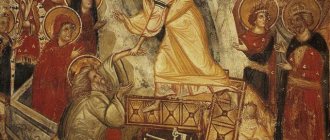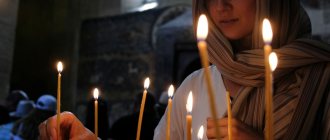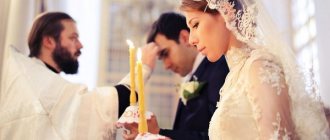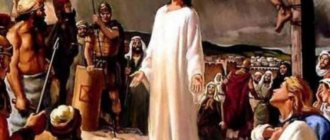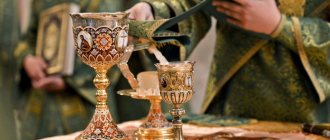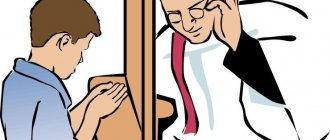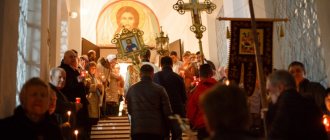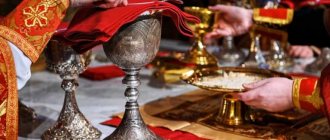Bright Week is the week after Easter, along with Holy Resurrection. The Orthodox hold divine services all these days - 4 services each: matins (matins), noon, liturgy and vespers (vespers). At this time, the Royal Doors - the iconostasis in the church - do not close until Saturday, that is, until the distribution of the liturgy. Before communion on Bright Week, you need to read not ordinary prayers, but special ones - with psalms, this is the Follow-up and the canon for Easter.
Obligatory prayers at the end of Holy Week
Despite the fact that God is in the soul and hears not only in church, but also wherever the convert is, before communion it is better to visit church after conversion at home. But even at home, special appeals to the Creator are pronounced in the ancient Church Slavonic language - repeating the same way as for several centuries. At this time, more than ever, it is necessary to follow generally accepted traditions.
On the eve of communion, they repeat 3 canons from the main “Rules for Holy Communion” - the names have already been mentioned - concluding with prayers for the coming sleep. In the morning they repeat:
- verses - “Although, O man, eat the Master’s Body, approach with fear, so as not to be burned: for there is fire, drinking the divine Blood for communion, first of all, reconcile with those who saddened you”...
- the first prayer of Basil the Great;
- the second - John Chrysostom;
- the third - Simeon Metaphrastus and his fourth.
They also repeat 6 more addresses of the Saints: John of Damascus, Basil the Great, Simeon the New Theologian - the seventh, eighth, ninth, again of Saint John of Damascus and the last - John Chrysostom. Perhaps the priest will want to introduce something new, rearrange the latest addresses, taking into account what is happening in a given period of time, add something of his own to the service.
Attention! The parishioners themselves, when reading prayers, must adhere to church rules.
During Communion, you must first mentally recite the verses - Behold, I begin Divine Communion. To the creator, do not scorch me with communion: For thou art a fire, unworthy of scorching. But cleanse me from all defilement, and then: “Thy secret supper this day” and troparia - you have sweetened me with love, Christ, and you have changed me through your Divine zeal...
Until what day is the Easter canon read?
The apostles, actually the closest disciples of Christ, for a long time did not believe the myrrh-bearing women that Christ had risen, until He Himself appeared to them.
Only after the Resurrection did the Apostles believe in the Divine will about the Crucifixion, death and the Kingdom of the Lord and understood this to the end. Orthodox Christians feel God's help and do not doubt the Resurrection of Christ, celebrating his memory every Easter. The interpretation of this holiday is that we, again and again, together with the apostles, enter into this joy when we sing the canon and troparia of Easter “Christ is Risen!” Many Orthodox Christians are interested in whether it is possible to read the canon in their home and for how long, until what day is the Easter canon read, and what is its interpretation.
Rules for Holy Communion
Preparation for Communion in order to take part in the Sacrament are spiritual exercises that take place under the supervision of a confessor in order to achieve a special moral infusion. A priest whom you especially respect can become a confessor. Preparation consists of reading prayers and general repentance. But it is important not only to follow certain rules, but also to long for union with Christ.
There are 2 types of prayers - church and home. It is necessary not only to attend services, but, in order to prepare, to constantly conduct divine services at home, out loud or in the shower, silently. A mandatory rule is to attend prayers in God’s temple on the eve of Easter. At home you need to read:
- Following to communion or the Orthodox prayer book;
- canons: repentance to Jesus, prayer service to the Most Holy Theotokos, to the Guardian Angel;
- Akathist for Holy Communion.
Some priests recommend reading the Easter Canon throughout Bright Week, regardless of the time of day. It is considered an equivalent replacement.
Those who have not observed fasts cannot partake of Christ’s body and blood without confession. If a person is not sufficiently prepared, he must tell his confessors this. In this case, repentance is prescribed - it is recommended to fast for a certain number of days, from 3 to 7, before Communion.
At this time, it is necessary not only to abandon the fast food. They limit their drinking, refuse spiritual entertainment - not only visiting public places, restaurants, theaters and cinemas, but also watching movies at home and listening to secular music. Restrictions are placed on the physical intimacy of spouses.
Strict fasting begins not after Easter, but before Communion. People go to the temple on an empty stomach, as before testing their blood sugar levels. But you can’t not only drink, eat, but also smoke.
Attention! If you need to constantly take medications that affect your life, the church does not place any restrictions.
Already on Easter you need to tune in to a special state of mind. At this time, no one should make comments, judge, or gossip. Whenever possible, you should choose solitude. Even if your loved ones are silent, you inevitably watch what is happening, which is why you won’t be able to fully concentrate. But, when at this time you read the Gospel, study the lives of the Saints or review books with spiritual content, do not be distracted by worldly things. It is advisable to refuse to meet with people who do not think about the Divine and may push them to sin.
Before Communion, you need to cleanse yourself - list your sins to the priest. Choosing a confessor is not easy. Unfortunately, nowadays we have encountered confessors who do not observe the secret of confession. Repentance is not limited to talking with a clergyman. You need to apologize to those who were offended, try to make peace with those who hurt you. When listing misdeeds, you should give an account of your actions and not shift the blame to others.
If you are visiting church for the first time, because you have not thought about the soul before, you should approach your confessor the day before, before the church is filled with parishioners. But this can be done before the liturgy. Among believers, it is considered good form to arrive early. Lateness is seen as neglect. In some churches, confession continues after the liturgy - exceptions are made for children and the sick. Parishioners under 7 years of age are not required to go to confession. It is enough for them to receive the blessing once.
When the Holy Gifts are taken out of the altar, parishioners must let in everyone who, due to physical limitations, cannot see the sacrament from behind. This group includes the infirm, including wheelchair users, and children. You should prepare in advance before approaching the Chalice: fold your arms over your chest. You can’t be baptized at this moment - there are a lot of people around, you can accidentally push someone away. Approaching the gifts, they pronounce the Christian name loudly, and then open their mouths and partake of the Holy Gifts. You should immediately swallow without holding it in your mouth or savoring it, kiss the edge of the dish, quickly move to the table and taste the prosphora. Now wash it down with warm water.
But it is not customary to leave immediately; you must wait until the priest is free and kiss the Holy Cross. For the next 24 hours, you should behave decently, completely refraining from shouting and swearing. Otherwise there is no point in Holy actions.
The Easter Canon, what is it and until what day is it read?
The Canon of Easter is sung or read immediately after the procession during the entire Easter Matins. They also read it if they want to prepare home prayers for Communion on Bright Week, before the Liturgy. There is no reading condition. The interpretation is simple - these are very bright, joyful words, through them we understand the beginning of the Resurrection of Christ. You can sing them yourself; you can also read or listen to the text with subtitles on video. You don’t even have to think about until what day to read - just pray even outside of Easter days.
Christ rose again a day later, appearing to the holy myrrh-bearing women, who became famous for the fact that they believed in His Resurrection before the apostles. . They received the name “myrrh-bearers” thanks to their main feat of fearlessness - they brought precious myrrh to the Holy Sepulcher in order to perform the complete burial of Christ, despite the danger from the Roman guards. All the Gospels tell us that Christ was one of the first to appear to Saint Mary Magdalene after the Resurrection. Together with Mary of Cleopas, Salome, Mary of Jacob, Susanna and Joanna (the exact number of myrrh-bearing women is unknown), she wanted to go to the tomb of Christ, but she came first, and it was to her after His Resurrection that He appeared alone. At first she mistook Him for a gardener, obviously not recognizing Him after the Resurrection, but then she fell to her knees and exclaimed: “My Lord and my God!” – realizing that Christ was in front of her.
Features of Communion at Easter
Different ministers talk in their own way about the rules of preparation before communion and confession, and explain what prayers need to be read. There were so many discrepancies that in 2015, a bishops' meeting held in Moscow approved special canons.
It is accepted that during this week one should practice singing psalms, reading Divine scriptures, triumphant and rejoicing at the rebirth of Christ. That is, Christians must prepare themselves for communion all this time.
Attention! There is no need to fast during Bright Week after Easter. After midnight, it is enough to refuse food, limit drinking or abstain.
How to prepare for communion during Easter week - recommendations from Abbot Peter
It is obligatory to take communion. I will give the following arguments:
- At the very beginning of the formation of Christianity, people were not allowed to attend the Liturgy without participation in the Holy Sacraments. But, when people began to do more ordinary things, the level of piety began to fall, the Easter canons, on the one hand, became stricter, and on the other, they appeared for lay people and the clergy. It got to the point that they began to receive communion once a year, only on Easter. But ideally, you need to prepare for this, listen to the liturgy, especially on Maundy Thursday, Pentecost, but ideally throughout the year.
- It is advisable to abandon the custom supported by many confessors. They allow people on whom penance has been imposed for grave sins to receive communion on Easter, that is, once a year. Thanks to this, sinners could join in and experience the joy of the Holy Holiday, but this does not mean at all that the sin has already been forgiven. Therefore, an unfounded idea arose that only fornicators and robbers should read prayers before communion on Bright Week in order to come to communion.
No, the Church does not have separate rules for preparing for the Easter night service for sinners and righteous people - everyone receives communion equally. But John Chrysostom, exclaiming, rejoice, calls not to start meals with previously forbidden dishes, but to praise Christ.
- The dishes served on Easter night are a continuation, not a replacement, of the sacrament. Those who do not read the sequence for Holy Communion, but immediately proceed to the meal, can be considered followers of the Old Testament, for these are the traditions of Judaism.
- Some people believe that it is impossible to receive communion on Easter because we begin to eat fast food. But why then do you need to read the Liturgy? This prayer prepares for the end of Lent.
- Many believe that it is enough to read the canons only before communion, which will help to prepare sufficiently. This view is acceptable, but I personally believe (Hegumen Peter) that only those who have led a balanced life all year should receive communion on Easter and perceive communion as a cure for illnesses of the soul.
Attention! Priests should not refuse communion to the laity, despite their sins. We need to look for wise confessors who will help us strengthen our spirit. If this does not happen, then people will hide their sins, or find another, more accommodating shepherd.
Opinion on the preparation of Archpriest Valentin Ulyakhin
He says that the first Christians received communion constantly, they were ready to live for the sake of Christ, and even accepted martyrdom. However, at that time preparation was not compulsory; at that time, a general prayer and sermon, followed by a meal, was sufficient.
There are no regulations or established rules in the Four Gospels, and in the Gospel there are no explanations of how often one should receive communion during the year. Prayer rules based on the Holy Scriptures appeared only in the 4th–5th centuries.
There are other opinions of priests, but they all agree on one thing - on the night after Easter you need to prepare for something great. At this time, you should cleanse yourself of all sinful things and appear before Christ already clean.
Preparation process
Before Communion, it is necessary to comply with the established list of rules and church requirements. The full process of Succession occurs after the layperson has fulfilled the following conditions:
- Compliance with physical and spiritual fasting.
- Reading the prayer rule.
- Confession one day before Communion.
- Observance of the Eucharistic fast.
- Quitting smoking on the day of the sacrament.
On a note! A canon is a church rule. In this case, we mean the three-canon - three obligatory prayers for Holy Communion, which are read in strict sequence.
Physical and spiritual fasting. In the first case, this means a complete abstinence from animal food, in the second - abstinence from entertainment and reading various spiritual literature. The limitation period is 3 days.
Reading the prayer rule. Here it is necessary to read three canons from the prayer books.
Repentant - Jesus Christ
Prayer service to the Mother of God
Guardian Angel
Follow-up to Holy Communion.
Confession. It is imperative to confess the day before the sacrament at the evening service.
Eucharistic fast. It is understood that you cannot drink or eat from midnight on the night before Communion.
To give up smoking. You should not smoke for about a day or at least before the start of the sacrament.
Important! In the last three days, reading prayers is mandatory. The prayer for Holy Communion is read in Russian, any of the three canons or all three at once (preferably).
Recommendations for proper preparation
A few days before Communion, it is necessary to prepare morally and spiritually. The minimum period for such undertakings is the last 3 days, but it is better to allocate a little more time for this.
How to read the Easter canon and until what day
If in churches during daily services we ask for all people, for God’s help and protection for everyone and for everything, then at home prayers are read, which contain petitions to the Lord specifically about your troubles and joys. Prayer calls upon you the grace of God, lets the Lord into your life, gives peace to your heart and strengthens your faith that the Lord will manage all your health for the better.
- The prayer should be read as a means of helping the Lord, preferably in silence, at least, nothing should distract you.
- It is important to focus on the words of the prayer so that your thoughts do not wander.
- Give up rote memorization and repetition, trying to understand the meaning of the spoken words and their deep meaning, their power in this and other reality.
On Holy Monday before Easter, special evening services begin, where prayers are read in remembrance of the death and resurrection of Christ. On Holy Thursday, all Christians try to be at the Communion of the Holy Mysteries of Christ. In the evening on Holy Thursday, the Service of the Twelve Gospels is celebrated, where excerpts from the Gospels about the torment and death of Christ on the cross are read. On the morning of Holy Saturday, a special matins is performed, the priests already dress in white pre-Easter clothes.
The whole thing is crowned by a night procession of the cross, Easter Matins and the Liturgy on Easter night from Saturday to Sunday. During Matins the Paschal Canon is sung and the Paschal Hours are read.
